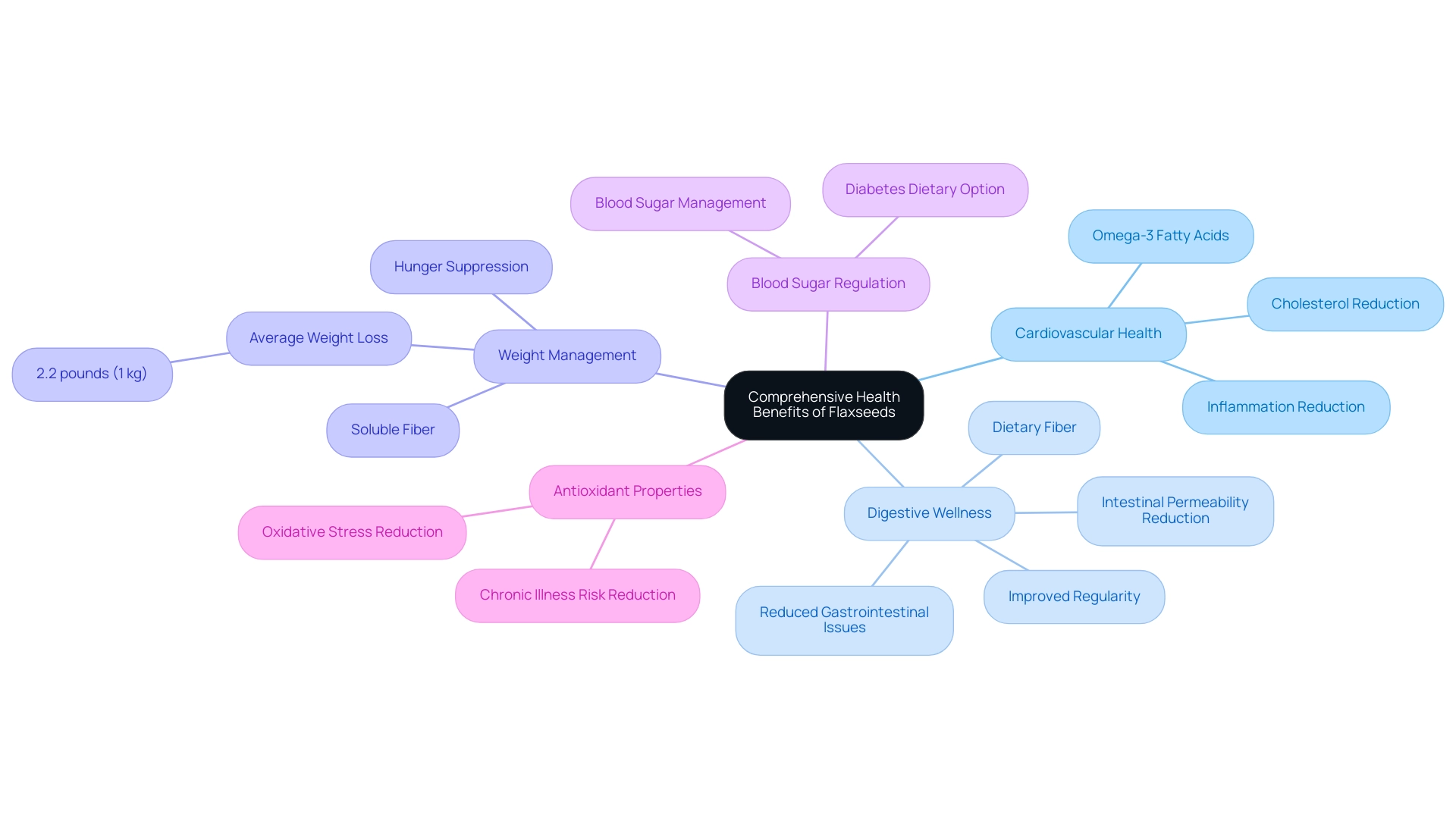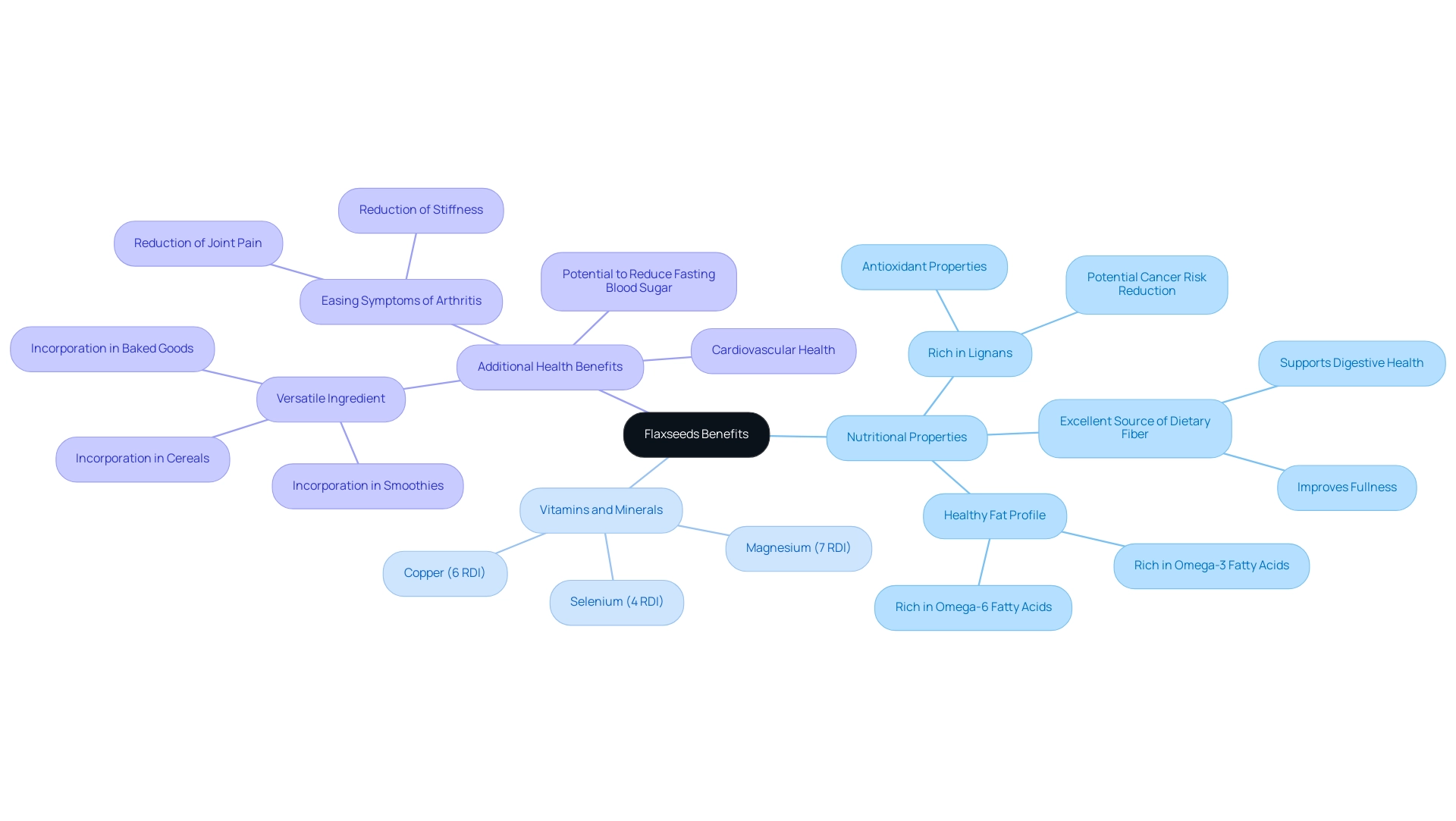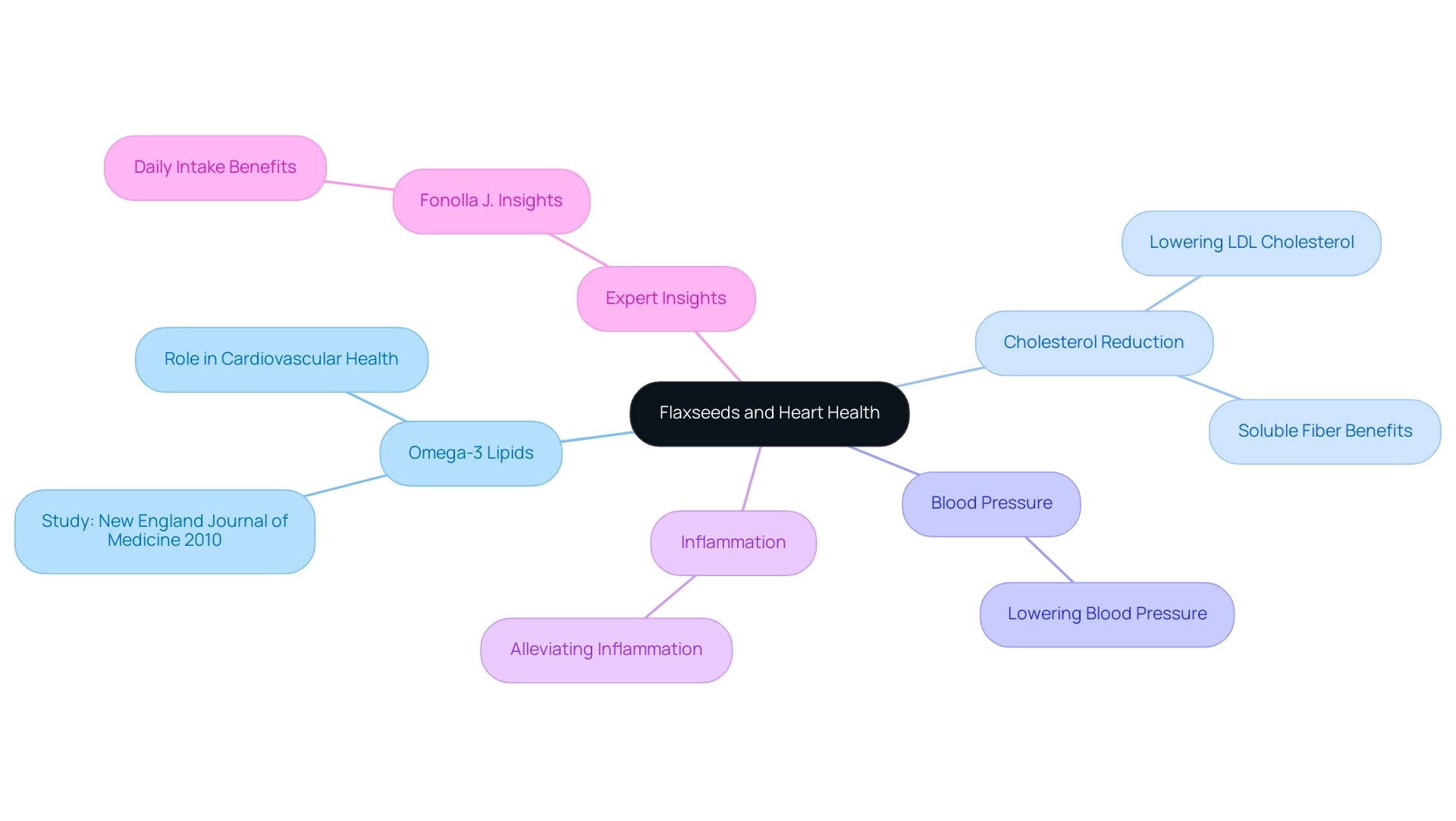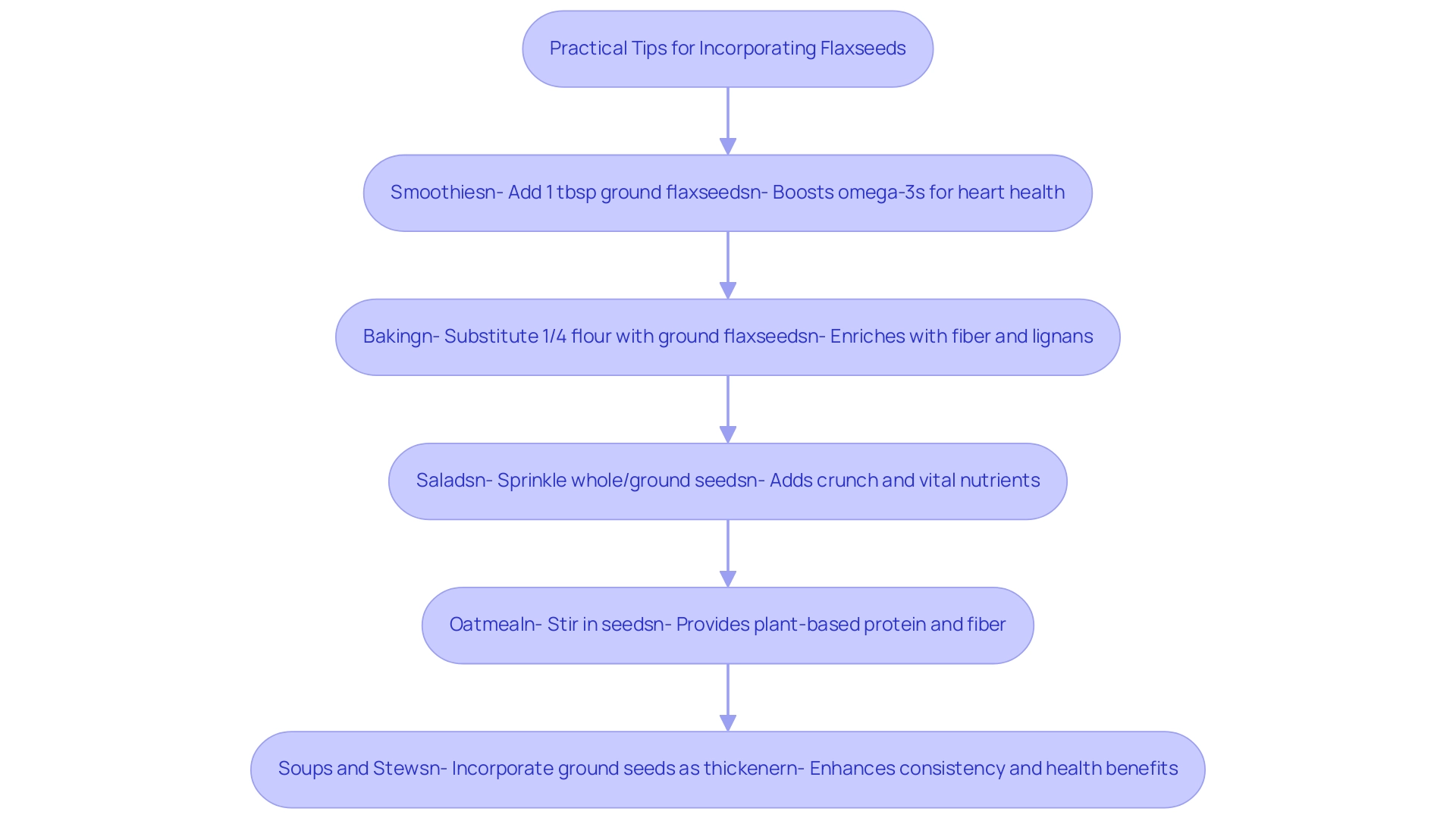Introduction
Flaxseeds have emerged as a vital component in the quest for improved health, celebrated for their extensive range of benefits that support overall well-being. Rich in omega-3 fatty acids, particularly alpha-linolenic acid (ALA), flaxseeds play a crucial role in promoting heart health by reducing inflammation and lowering cholesterol levels.
Beyond cardiovascular advantages, these tiny seeds are packed with dietary fiber, which not only aids digestion but also helps manage hunger and blood sugar levels. Recent studies underscore their potential in enhancing gut health and even reducing the risk of chronic diseases.
As the understanding of flaxseeds' nutritional profile expands, it becomes increasingly evident that incorporating them into daily meals can significantly contribute to a healthier lifestyle. This article delves into the myriad health benefits of flaxseeds, practical ways to include them in one’s diet, and essential considerations for safe consumption.
1. The Comprehensive Health Benefits of Flaxseeds
Flaxseeds are frequently acknowledged for their numerous flax seeds benefits, serving as a nutritional powerhouse and providing an impressive range of advantages crucial for overall well-being. They are especially rich in omega-3 lipids, specifically alpha-linolenic, which is well-documented for its role in promoting cardiovascular well-being. This essential fatty acid aids in reducing inflammation and lowering cholesterol levels, thereby promoting cardiovascular function.
Alongside their heart-beneficial characteristics, these seeds are abundant in dietary fiber, which boosts digestive wellness by enhancing regularity and possibly lowering the likelihood of several gastrointestinal issues. Significantly, recent studies have shown that a daily consumption of
40 grams of these seeds over 12 weeks greatly lowered intestinal permeability, highlighting their effect on digestive well-being. Furthermore, a case study titled 'Weight Loss Potential of Flax Seeds' highlighted that the soluble fiber in these seeds can suppress hunger and cravings, with participants losing an average of 2.2 pounds (1 kg) compared to control groups.
Flaxseeds have also shown promise in managing blood sugar levels, making them a valuable dietary option for individuals with diabetes. The antioxidants present in these seeds further enhance cellular well-being by fighting oxidative stress and reducing the risk of chronic illnesses. As Verena Tan, RD, PhD, remarks, "Including these seeds in everyday diet can produce significant wellness enhancements."
Overall, the flax seeds benefits in one's diet solidify their role as a vital element in a comprehensive wellness strategy.
2. Nutritional Powerhouse: What Makes Flaxseeds Essential
The benefits of flax seeds include being a
nutritional powerhouse, revered for their dense concentration of essential nutrients that solidify their reputation as a superfood. Notably, the flax seeds benefits include:
- Being rich in lignans, a type of plant compound known for their antioxidant properties, which may play a role in reducing the risk of hormone-related cancers.
- Being an excellent source of dietary fiber, which encompasses both soluble and insoluble types that support digestive well-being and improve sensations of fullness.
The benefits of flax seeds also include:
- A healthy fat profile, rich in omega-3 and omega-6 fatty acids, which supports cardiovascular health and cognitive function.
- Easy incorporation into various foods, including cereals, smoothies, and baked goods, making them a versatile ingredient in a health-conscious diet.
- Abundance in vital vitamins and minerals, including:
- Magnesium, which provides 7% of the RDI
- Copper at 6%
- Selenium at 4%
These nutrients are all integral to energy metabolism and overall well-being.
According to nutrition expert Adda Bjarnadottir, the flax seeds benefits include the potential to reduce fasting blood sugar in people with diabetes and lower the risk of several cancers. Additionally, a case study highlights that the benefits of flax seeds may help reduce joint pain and stiffness associated with arthritis, showcasing their potential for those suffering from such conditions. This impressive nutritional profile highlights the flax seeds benefits and underscores the significance of incorporating these seeds into a health-conscious diet, encouraging individuals to explore their versatile uses in meals and snacks.
3. Flaxseeds and Heart Health: A Closer Look
Comprehensive studies show that the omega-3 lipids found in flax are essential for improving heart health. These fatty substances aid in lowering blood pressure, reducing cholesterol levels, and alleviating inflammation—key risk factors linked to heart disease. Significantly, soluble fiber present in linseeds helps in reducing LDL cholesterol, often called 'bad' cholesterol, by attaching to bile substances, thereby promoting their removal from the body.
Regular intake of flaxseeds benefits cardiovascular well-being by being associated with a decreased risk of heart attacks and strokes, highlighting their importance as a dietary staple for individuals. A study published in the New England Journal of Medicine in 2010 supports these advantages, emphasizing the role of
n-3 lipids in the prevention of cardiovascular occurrences following myocardial infarction. Furthermore, a statistic from recent research shows that the percentage of ALA in red blood cells rose by 0.16% in the walnut group compared to only 0.02% in the control group (P < 0.001), demonstrating a notable effect of omega-3 lipids on cardiovascular well-being.
Additionally, expert insights, such as those from Fonolla J., emphasize that a daily intake of foods enriched with omega-3 fatty acids can enhance metabolic and bone biomarkers, particularly in postmenopausal women. Consequently, incorporating flax seeds into one’s diet can offer flax seeds benefits that enhance overall cardiovascular results, backed by findings from the case study titled 'Marine Fish Oils and Coronary Artery Disease Prevention,' which examines the role of marine fish oils in cardiovascular well-being.
4. Incorporating Flaxseeds into Your Diet: Practical Tips
Including these seeds in your meals can be both easy and pleasurable, providing numerous flax seeds benefits for wellness. As Shapiro notes, "Not all cholesterol is bad—flax helps boost the kind you need, and flushes out the kind you don’t." Here are several effective strategies:
-
Smoothies: Enhance your morning smoothie by adding a tablespoon of ground flaxseeds. This not only enhances the nutrient composition but also brings in essential omega-3 lipids (ALA), which are vital for cardiovascular well-being. The benefits of flax seeds include being an excellent source of fatty acids, proteins, lignans, and dietary fibers.
-
Baking: When preparing baked goods, consider substituting up to one-fourth of the flour with ground seeds. This adjustment enriches your breads and muffins with dietary fiber and lignans, showcasing the flax seeds benefits that are linked to improved heart health.
-
Salads: For enhanced texture and nutrition, sprinkle whole or ground seeds over salads. They provide a satisfying crunch while showcasing the flax seeds benefits of contributing vital nutrients.
-
Oatmeal: Stir seeds into your oatmeal or yogurt for a hearty breakfast, delivering a dose of plant-based protein and fiber that promotes satiety.
-
Soups and Stews: Incorporate ground plant seeds into soups and stews as a natural thickener. This not only enhances the dish's consistency but also provides flax seeds benefits for health. Additionally, it’s important to note that whole seeds retain all nutritional benefits but may be tough to chew.
To enhance digestibility, it is recommended to
grind the seeds or toast them before consumption, while limiting raw intake to avoid thyroid function interference. By effortlessly incorporating these seeds into different dishes, individuals can enjoy the flax seeds benefits and their nutritional perks without significantly altering their eating habits.
5. Potential Side Effects and Considerations
Flax seeds benefits are lauded for their myriad health advantages; however, moderation is crucial to avoid potential adverse effects. High consumption of these seeds, particularly for those unaccustomed to a high-fiber diet, can result in digestive discomfort, including symptoms such as bloating and gas. Furthermore, these seeds are rich in phytoestrogens, which may influence hormone levels.
Therefore, individuals with hormone-sensitive conditions should seek guidance from a healthcare professional prior to incorporating these seeds into their dietary regimen. It is also advisable to consume ground seeds rather than whole seeds, as whole seeds may remain undigested, thereby inhibiting nutrient absorption. Recent reports indicate that starting with small doses and gradually increasing to 1–2 tablespoons (10–20 grams) daily can mitigate these digestive issues.
Additionally, a study titled 'Hypoglycemic Properties of Flaxseed' evaluated the effect of this seed on glycemic control in patients with type 2 diabetes, revealing that fasting blood glucose significantly improved in both the seed and psyllium groups compared to placebo, with the seed showing a reduction of 27.8 mg/dL. As nutrition author
Yvette Brazier states, 'Incorporating these seeds into your diet can be beneficial, but it's essential to do so mindfully.' By understanding these considerations, individuals can safely harness the benefits of flax seeds while minimizing potential side effects.
Conclusion
Flaxseeds stand out as a remarkable addition to a health-conscious diet, offering a wide array of benefits that significantly contribute to overall well-being. Their richness in omega-3 fatty acids, particularly alpha-linolenic acid (ALA), plays a pivotal role in enhancing heart health and reducing inflammation. Coupled with their high fiber content, flaxseeds not only support digestive health but also assist in weight management and blood sugar regulation.
Incorporating flaxseeds into daily meals is both simple and versatile. Whether added to smoothies, baked goods, or salads, these tiny seeds can enhance the nutritional profile of various dishes while providing essential nutrients like lignans, vitamins, and minerals. However, it is important to consume them mindfully, starting with small amounts to avoid potential digestive discomfort and consulting with healthcare professionals if there are concerns regarding hormone-sensitive conditions.
Ultimately, the inclusion of flaxseeds in the diet can lead to substantial health improvements, making them a vital element in a comprehensive wellness strategy. Embracing these nutritional powerhouses can pave the way for better heart health, improved digestion, and a reduced risk of chronic diseases, reinforcing the importance of making informed dietary choices for a healthier future.









































